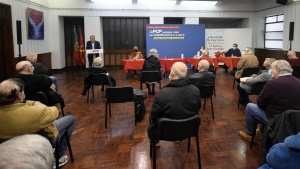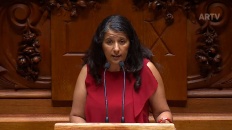Greetings to all of you for your presence and for the contributions you brought to this Public Session that discussed, in these times of epidemic, the worsening problems faced by our retirees and pensioners and the importance that the struggle has in their lives for the valorisation of their pensions and retirement and for the implementation of sanitary and health protection measures, which must be guaranteed and enhanced in this difficult situation we live in.
With regard to pensions and retirement, our commitment and our initiative aimed at valorising them are well known.
In February, the extra increase of ten euros was paid, with back payment to January, to approximately 1.9 million retirees and pensioners with pensions up to 658 euros.
This is an important measure that the government did not intend to take and, therefore, it is an achievement, only possible because the PCP never gave up fighting for the materialisation of the right to restore the purchasing power of all retirees, pensioners and the elderly, in January of each year.
It was possible to ensure this extra increase of ten euros for the lowest pensions in 2021, an amount that is added to the other extra increases that were possible to achieve between 2017 and 2020, also by proposal of the PCP. Increases that for some mean 24 euros and for others another 40 euros in the pensions of around one million nine hundred thousand retirees and pensioners.
We know that the vast majority of these retirees and pensioners have very low pensions, whose values are well below the poverty line, 501.20 euros in 2018.
These are pensions that do not allow the vast majority of them to have adequate food, to heat their homes on cold winter days, with many without money for the expenses with medicines or to access the network of equipment and support services in a situation of dependency and, much less, for a “small” extravagance for themselves or for their children and grandchildren.
A reality that is particularly laid bare and enhanced in this time of epidemic outbreak, with increases in expenses with the purchase of masks and sanitation gel to comply with the respiratory hygiene, and when many essential products are more expensive.
And if it is true that the amounts of extra increases do not change the structure of their low pensions, because it is a result of the right-wing policy based on low wages, even those who have had long contributory careers, but also of the underreporting of wages to Social Security so loved by the employers, including big capital, it is also no less certain that another 34 euros or 50 euros in the amount of these pensions in the last five years makes a difference in mitigating the difficulties and the retirees and pensioners feel the importance of these extra increases!
Unacceptable and unfair is also the situation created for pensioners with pensions above 658 euros who were once again left out, in 2021, from the extra increase of ten euros, because PS and PSD prevented PCP's proposal. A proposal that aimed to restore criteria of justice for these pensioners who have been denied the right to update their pensions annually.
It is worth remembering that many of these pensioners have had the value of their pension unchanged since the date they retired. Many with them frozen, between 2011 and 2015, and with insufficient annual increases in some of the following years.
However, it is important to evaluate the true meaning and social reach that results from the PCP's proposals for an extra valorisation of pensions for all retired people.
It is a process of struggle that resists and is opposed to the practice of right-wing policy governments that have aimed and aim to reduce the value of the pensions paid by the public system for successive generations of retired workers. A reduction that is part of a process of subversion of the public Social Security system, to destroy it as an instrument of justice in the redistribution of National Income and to open the doors to the expansion of private pension funds.
A project that the forces that have promoted it have not abandoned and await the opportunity and conditions to relaunch it.
Also within this framework of policies of devaluation of pensions, it should not be forgotten that the PS government intended to condition annual increases, between 2016 and 2019, to the mere unfreezing of the annual update mechanism, which did not even allow the replacement of lost purchasing power. Had it not been for the PCP's initiative, this would have happened.
A mechanism created by the PS and that the PCP fights for it to be changed, giving voice to a fair demand from retirees and pensioners.
This year, the application of this mechanism of annual update of pensions that makes them depend on the performance of the economy, would mean zero increases in pensions, were it not for the proposal of the PCP of an extra increase.
A struggle that needs to be extended also to change the criteria for accessing the Complementary Solidarity of the Elderly. Also on this matter, the PCP has presented very concrete proposals, aiming to make the access of pensioners to this Complement fairer and more accessible, namely by the elimination of the inclusion of their children's income as a criterion for accessing this social benefit, as well as its payment during 14 months.
The PCP never advocated that the fight against poverty among the elderly could be achieved through the Complementary Solidarity of the Elderly, but nevertheless, it never stopped intervening for its improvement, not abdicating and always having as a background the need for the valorisation of pensions, through extra increases.
It is also important to take into account, as already mentioned, the PCP's proposal to create two new minimum pension brackets in the general Social Security regime for those who have 36 to 40 years of social security payments, the value of which should be set at 95% of the Social Support Index, and for those over 40, the minimum pension amount should be equal to the value of this Index.
A proposal that was rejected by the PS, when it aims at valorising long contributory careers, doing justice to those who worked a lifetime and who due to low wages will have a very low pension prospect.
As already mentioned, the PCP, with its proposals, shows the distinctiveness of its stand of unrelenting defence of the public Social Security system, as the mainstay of guaranteeing social protection for workers throughout their lives, particularly in old age.
Therefore, we will continue to intervene for the implementation of an alternative policy based on the consolidation and reinforcement of the public Social Security system, strengthened with more workers, safeguarded in its sources of funding, including with the guarantee of transfers of funds from the State Budget for the payment of all exceptional measures.
A Social Security strengthened to fulfil its aim of ensuring the valorisation of pensions, for those who have retired, the elimination of penalties on early pensions for workers who have already retired, as well as for guaranteeing the right to retirement with decent pensions, eliminating the sustainability factor, restoring the retirement age to 65 years and allowing the right to early retirement for those who have 40 years or more of Social Security payments.
We will continue, as already mentioned by comrade Diana Ferreira, to intervene so that measures are taken to overcome the difficulties and shortcomings felt by the institutions, namely in the nursing homes.
Difficulties that worsened with the epidemic and that require the hiring of more workers to ensure the necessary health measures and a quality service for the elderly; so that the various social responses of the network of equipment and support services for the elderly are articulated - home care, nursing homes, day care centres, social centres - aiming to ensure conditions of equal access to all who need them, regardless of social status and the region where they live.
But also the expansion of the home care service - meals, hygiene, house cleaning, help for going out to the street, among others - according to the needs of the different regions, creating new responses that ensure the elderly in a situation of dependency the right to remain at home, if they so choose.
Increasing and strengthening Social Security teams in order to adequately respond to the needs of Private Social Solidarity Institutions (IPPS), considering their financial, human and technical resources is another aspect that must be taken into account, such as creating new vacancies in homes for the elderly on a waiting list, providing Social Security equipment that, while not occupied or in operation, is converted into a public response and combats the proliferation of illegal nursing homes.
On the other hand, the reality in the country demands, as we have stated, exceptional measures to protect health and life, with a particular concern for older people.
In the face of the epidemic, we reaffirm that it is a national imperative: to strengthen the National Health Service, ensure individual protection, carry out protection education.
In the fight against the epidemic, Portugal needs measures to prevent and contain the virus. Without calling into question the need for exceptional measures in an exceptional situation, the truth is that aggressive lockdown alone does not solve the health problem in the country, with the inevitable stop-and-go resulting from it. The country needs other measures and other solutions. Measures and solutions that include increasing testing, ensuring screening and vaccinating the population quickly.
These are three measures that cannot be taken independently of each other and, therefore, require a great capacity of organisation and management of services and the necessary investment in the acquisition of vaccines, tests and the hiring of professionals who are in short supply to carry out the measures.
In view of the situation created by the lack of compliance with the supply of vaccines, it is necessary to decide on behalf of national interests and of the Portuguese people to purchase other vaccines already authorized by WHO in several countries and not be held hostage to decisions by the European Commission.
But it is also necessary to guarantee the hiring of thousands of professionals lacking in hospitals and healthcare centres and to expand the National Health Service's patient hospitalisation capacity, for the response not only to Covid-19, but for the urgent recovery from delays and the return to normality in the activity of this essential public health service, which is the NHS.
We all know that the impacts of lockdown on the lives of retirees, pensioners and the elderly are very serious, particularly as a result of prolonged situations of isolation and loneliness, deprived of contact and family and social life. In many cases, social inequalities and situations of poverty are experienced in solitude, aggravating their physical and psychological health, which is already much shaken.
We need to quickly overcome this situation, fighting to ensure the set of measures that we have proposed and defended here, namely to ensure decent pensions and health protection conditions.
Lastly, we want to affirm that retirees, pensioners and the elderly can count on the PCP's initiative in solving their problems and in supporting their intervention and struggle, as well as their representative organisations that continue to intervene in defence of their rights.








